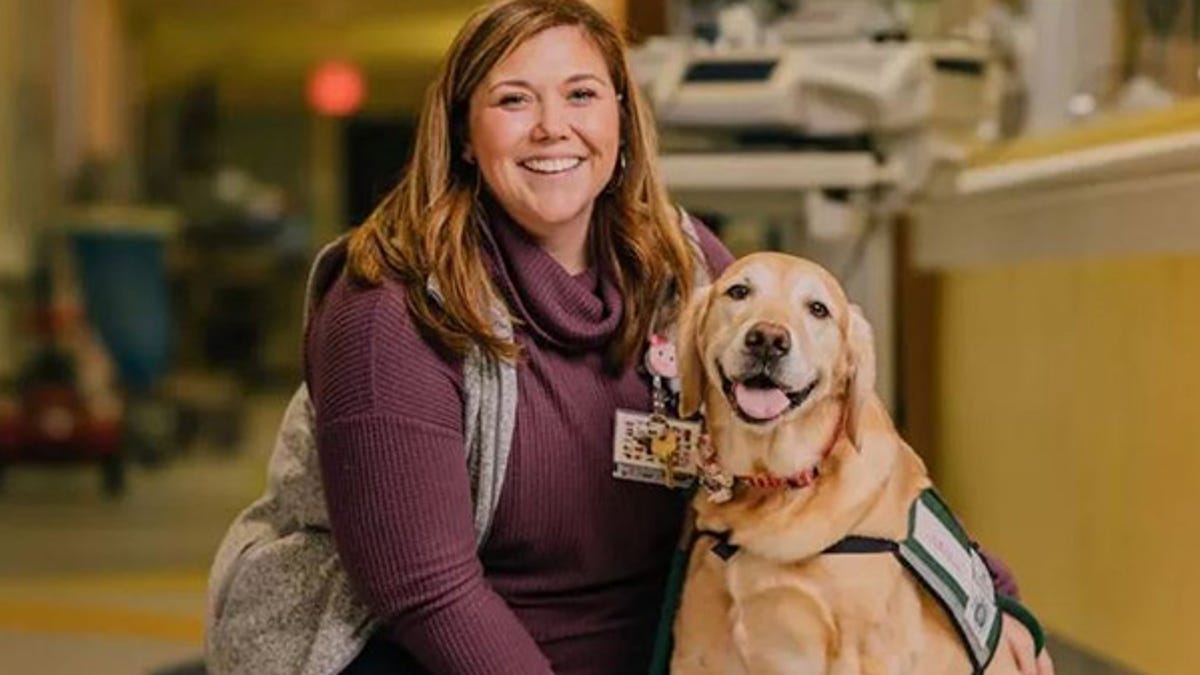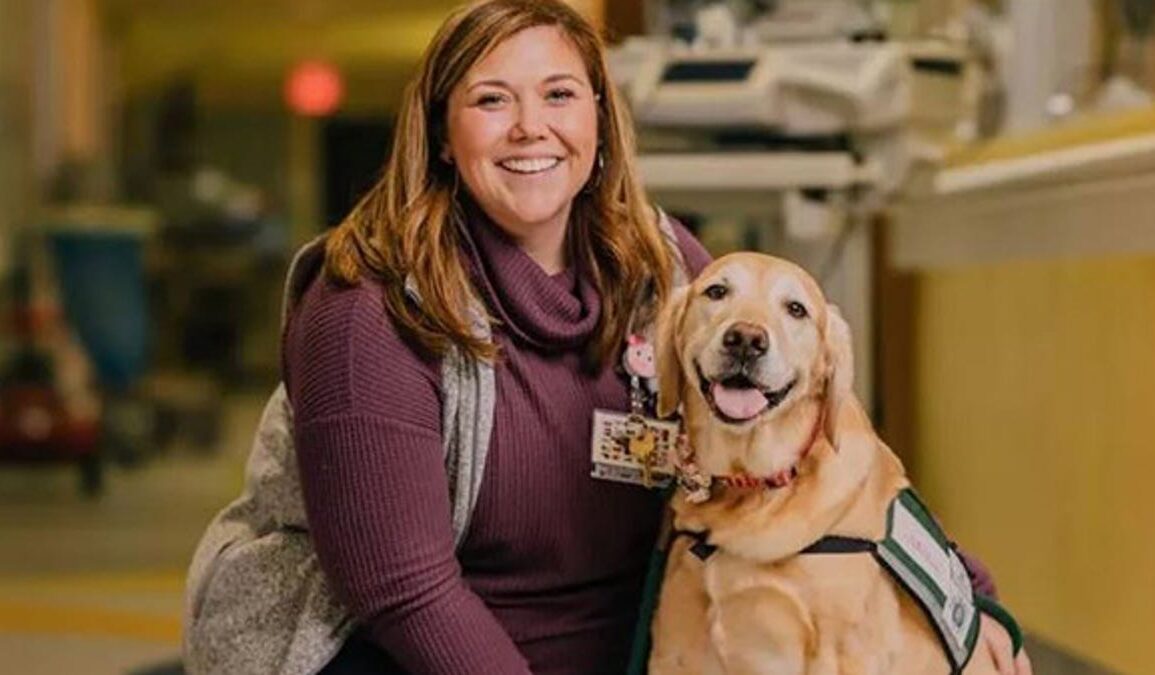
Dogs know. Without saying a word, a dog can nuzzle up just so, offer a wag, nudge an arm and provide comfort that transcends language or species. And as much as that can help adults, it is only magnified when the one in need of care is a child.
That’s why some of the most popular members of the healthcare teams at Prisma Health Children’s Hospital – Upstate walk the halls on four legs, snuggle next to patients and invite belly rubs from their new friends. The Canine F.E.T.C.H. (Friends Encouraging Therapeutic Coping and Healing) Unit is an animal-assisted therapy program at Prisma Health – Upstate that serves patients and families through the irresistible love of facility dogs.
Play – with a purpose
Taylor Windell is a child life specialist and the manager of Child Life & Special Programs at Prisma Health Children’s Hospital.
“Child life specialists are members of the healthcare team,” Windell said. “We have a background in child development. That is what we really go to school for – to learn how kids learn, how they view the world, how they develop. We put that knowledge into practice in the healthcare setting, whether that be in a hospital or any other clinic type setting or a stressful environment.”
And even the friendliest hospitals can be stressful, especially if you’re little.
“The hospital being a big, big place where we see stressful events happening with kids, our role is to function kind of like teachers for kids in the hospital,” Windell said. “We’re teaching them about the hospital experience. If they’re just there for an outpatient visit, whether that be an MRI or some sort of imaging, we prepare them for what that visit looks like. If they’re here more long-term, our services go a little bit more in depth, and we prepare them for a diagnosis with education or accompanying them for procedures while they’re here. The description can be very broad and very detailed, but really we just help to make the hospital experience more pediatric friendly for children, and give them a little bit more control over this experience. That control really is the understanding at their level of what’s happening to them while they’re here, and then also just giving them an outlet to still be a child.”
Often, that involves what Windell called “play with a purpose.”
“Because we know how they learn is through play, and sometimes it’s just because that’s what kids do, we want to be able to provide an environment and a space for them to feel like they can also still just be a kid,” she said.
Adding a dog to the healthcare team is good medicine
“I think everyone comes to the bedside with a goal, something that they have to accomplish.” Windell said.
Physicians are often sharing a lot of medical information. Nurses often have to give medicine or do procedures. Child life specialists help bridge the gap, giving information in ways that families can understand and helping kids be ready for what’s coming next. Dogs help.
“The facility dog program was born in 2016,” Windell said. “It was an extension of what already existed, which is our pet therapy program.”
Pet therapy proved to be very comforting for patients, but those animals belong to volunteers, who have limited time and limited access in some situations. Windell learned about facility dogs at a child life conference.
“There’s a lot of questions when it comes to dogs permanently in a healthcare system,” she said.
Team members serve as handlers and become the dogs’ families. Windell was the handler for Vivi, the first member of the F.E.T.C.H. team, who served from 2016-2022. Vivi set a high bar for the dogs who followed, but the team now includes facility dogs that serve adult patients as well.
“Especially if kids love dogs, they are so invested, and immediately that rapport is built, which is hard to do sometimes, especially if kids are nervous – and now they trust me and the information that I’m telling them, because I have a dog,” Windell said. “She was able to demonstrate how to hold still for MRIs and show that nothing hurt. And you know, Vivi wasn’t scared if she knew that the sounds were going to play. (A dog) brings a whole different dynamic to a visit to the hospital.”
The F.E.T.C.H. dogs have become so popular that patients are sometimes disappointed if one isn’t part of their care.
“I feel like we’ve done such a good job with our facility dog program that folks automatically assume that child life specialists are going to have dogs,” Windell said. “We certainly see that there’s a need and a gap in so many areas, but that’s where the fundraising and the donations really come into play, because these dogs are $25,000 a piece just for one dog, and that’s the initial upfront cost, not the ongoing costs that come into play. So we consider all factors when we introduce new dogs into our organization. We hear it from our patients when they are in a different place in the hospital that they’re not used to, and there’s not a dog, but there still is a child life specialist. They’re like, ‘I like you, but where’s your dog? Like, where’s the dog that’s supposed to be here?’”
As the program has expanded, two physicians now have dogs.
“We expanded F.E.T.C.H. outside of Children’s Hospital as well,” Windell said. “We have a chaplain in palliative care who has a dog, and we have a social worker who has a dog.”
You can help
Donations to the F.E.T.C.H. program help maintain and expand services. Learn more and see a video of the F.E.T.C.H. teams in action at prismahealthupstatefoundation.org/fetch. Donations can be designed for F.E.T.C.H. at prismahealthupstatefoundation.org/ways-to-give.
Prisma Health Children’s Hospital – Upstate has an Amazon wish list of items that help children when they come to the hospital. The list is updated regularly here, but Windell said parents can also donate items that their own child would use – toothbrushes and toothpaste, stuffed animals, coloring books for all ages (including teens), board games, etc. Currently, the greatest need is for stuffed animals.
This post was originally published on this site be sure to check out more of their content.













































